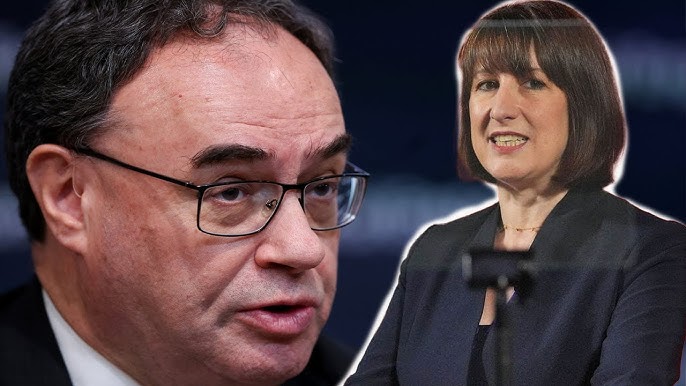 By Tamanveer Ahuja, Student at University of Exeter
By Tamanveer Ahuja, Student at University of Exeter
The divergence between the fiscal and monetary policies of the UK has caused the pound to slide to its lowest level in 14 months, while borrowing has reached a 16-year high. This raises the question: who is to blame for the UK’s economic mismanagement?
Critique of Rachel Reeves’ Economic Approach
According to economist Richard Murphy, Rachel Reeves is overly focused on her experience at the Bank of England, which she believes lends her credibility. She seems to hold the central bank in high regard, having worked under Governor Andrew Bailey, whom she still views as a superior. However, when it comes to her economic decisions, Murphy argues that she lacks the necessary intellectual capacity. What the UK needs is an integrated economic policy, but currently, the situation resembles a “disintegrated mess”.
The Bank of England’s Role in the Crisis
Murphy contends that the country is facing a manufactured crisis, as the Bank of England has set interest rates too high for too long. The consequences of this for the UK government could be severe. If there isn’t a response from the government, including directions for the Bank of England to lower interest rates—which they are allowed to do—we risk entering a state of austerity. According to Reeves’ fiscal rule, debt as a proportion of GDP is expected to decrease, but right now, the interest costs borne by the government are higher, in percentage terms, than both the inflation rate and the growth rate. Therefore, if she intends to balance the books as she claims, she will have to implement cuts in government spending. Murphy further argues that there is no valid reason to balance those books, labelling it a completely spurious and unnecessary goal for the government. Nonetheless, due to this aim, we may witness cuts in public services for no valid reason.
Under Section 19 of the Bank of England Act of 1998, Rachel Reeves can declare this situation an emergency, allowing the government to express its disagreements with the Bank of England’s decisions and potentially overrule them. There are two critical decisions that the government could consider overruling now, one being the current base interest rate of 4.75%, which is nearly equal to the interest rate the government is paying on its debt. In contrast, the EU is only paying an equivalent interest rate of 3%. The significant difference between these two rates is striking and presents a considerable advantage to the EU.
Contradictory Policies: Growth vs. Control
An important yet overlooked activity is the Bank of England’s sale of £100 billion worth of bonds each year in financial markets. These bonds were acquired during the 2008 financial crisis and the 2020 COVID-19 pandemic under quantitative easing (QE) programs. The bank is selling these bonds back into the market, and the sole purpose of this action is to reduce the size of its balance sheet. By doing this, the Bank of England is effectively removing money from the private sector economy for two reasons. First, they aim to keep interest rates high to control inflation, despite inflation currently being well below 3% and not posing any serious consequences. Second, they believe that limiting growth will help reduce inflation. This strategy stands in stark contrast to the proposals put forward by Reaves, who advocates for economic growth. It is impossible to achieve growth while the Bank of England continues to sell £100 billion in government bonds each year, thereby stifling the UK economy. This situation can be likened to trying to drive a car with one foot on the brake and the other on the accelerator, while also engaging the handbrake; such an approach will inevitably lead to chaos.
Parallels with Liz Truss’s Economic Policies
The circumstances today resemble those created when Liz Truss attempted to implement her economic strategies while the Bank of England did everything it could to undermine her efforts. The difference now is that we are experiencing pressure on the pound, which has fallen to its lowest point in 14 months, rather than a full-blown economic crisis. What we are witnessing is a complete mismanagement of the economy, where the Bank of England and the Treasury are issuing conflicting demands and claims, causing uncertainty among the public. It is crucial to rein in the Bank of England and provide clear directives, as their current decisions are detrimental to the UK economy. Murphy suggests that the Bank of England is deliberately pushing the UK economy into overdrive, which needs to be addressed.
The Interdependence of Fiscal and Monetary Policies
The fundamental issue at hand is a widespread misunderstanding of the independence of fiscal policy— which includes government spending and taxation— whereas monetary policy involves setting interest rates and controlling the money supply. In reality, these two policies are interdependent. The money supply is influenced by government spending, while funds are removed from circulation through taxation. Tax revenue does not finance government spending; rather, it limits the amount of money available in circulation. The money used for tax payments cannot exist unless it has first been generated through government expenditure. This is evident when we consider the cash in our pockets; it is created by the Bank of England and enters circulation through government spending.
Taxation, the money supply, and interest rates are all fundamentally interconnected. However, the misconception that we can separate these elements results in a lack of cohesive policy. Tony Blair once emphasized the importance of joined-up economic management, which is sorely lacking today. Currently, the Treasury operates under the belief that it can influence one side of the equation, while the Bank of England focuses on the other. This leads to both entities pursuing fundamentally different goals: one aiming for growth and the other seeking to control it.
Pivot Towards Chinese Investment Amid Economic Challenges
Reaves is choosing to seek investment from China rather than from markets closer to home, putting the UK at odds with Trump. Given the likelihood of sanctions that could be imposed on China, it doesn’t seem like a wise decision. Interestingly, Andrew Bailey accompanied this delegation to China. Murphy points out that the Bank of England has recognised the current absence of Russian investment in the UK and is searching for alternative sources of “hot money,” which they are now looking to China for.
Concentration of Wealth
In 1997, to appease neoliberal demands, Ed Balls and Gordon Brown made the Bank of England independent. Initially, this independence appeared effective, but since 2008, it has resulted in a series of economic disasters. The economy has stagnated, interest rates have risen sharply, and wealth accumulation in the UK has drastically shifted upwards. This concentration of wealth is detrimental to economic growth, as wealthy individuals often do not spend their money; they become wealthy precisely because they do not spend. As a result, this lack of spending stifles further economic activity.
Labour’s Shift from Traditional Principles
Labour’s plan focuses on growth, intending to make life easier and better for working people. However, it appears that large investments are primarily directed towards financial and legal services. This shift suggests that Labour has moved away from its traditional commitment to hardcore manufacturing that directly benefits the people of the UK. Financial and legal services often serve the interests of the wealthy, as these are the individuals who utilize such services. While job creation may occur in these sectors, the number of jobs created is likely to be minimal.
The Labour Party seems to have strayed from its foundational principles; their alignment with financial interests is apparent. Rachel Reeves has described finance as the “jewel in the crown” of the UK economy, a perplexing statement considering that finance does not produce tangible goods for consumption. This indicates that the Labour Party’s political philosophy is increasingly out of touch with the needs of the people in this country.
A Call for Unified Policy
Currently, market and business confidence are at all-time lows, largely due to unwise decisions such as raising national insurance contributions, which increases the cost of employing individuals. This approach contradicts the objectives of a Labour government that aims to stimulate economic growth. As a result, mounting pressure is being placed on the Labour government, leading to a decline in Rachel Reeves’ credibility.
The recent inflation figures, reported at 2.5%, may provide Reeves with some relief, especially as gilts experienced their best week since July. Additionally, the FTSE 100 reached a record high last Friday after a series of weak economic data affected the sterling, prompting speculation that the Bank of England will cut interest rates more aggressively to stimulate growth.

Great article. You are a good author. It was a pleasure to read.
Thank you for your kind words! I’m glad you found the article interesting.